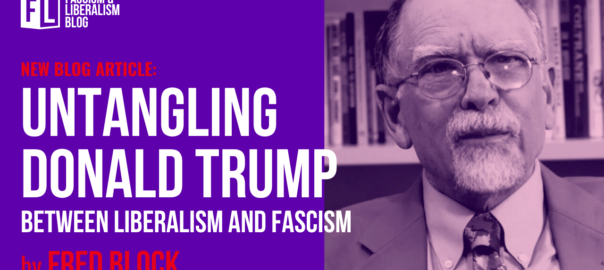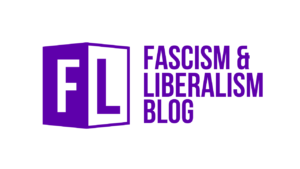Untangling Donald Trump: Between Liberalism and Fascism
Fred Block
13.08.2025
The relentless series of shocks in the first five months of Donald Trump’s second administration has left most observers stunned and confused. One horrendous set of policies has followed another. There is the destructive march of the Department of Government Efficiency (DOGE) team through government agencies, the abrupt ending of U.S. foreign aid programs, the on-again, off-again, on-again tariffs, the push for a major budget bill that will cut taxes for the rich while throwing millions off of medical coverage, the war against major institutions including the National Institutes of Health, the legacy news media, Ivy League Universities, the largest corporate law firms, and the disregard of the courts in sending noncitizen detainees to overseas Gulags. And now we have the U.S. Marines on the streets of Los Angeles in response to minor acts of violence. How can we make sense of these changes?
Trump’s initiatives are part of an authoritarian playbook. Trump is using every ounce of executive branch power to cow potential opponents into submission. Arresting pro-Palestinian campus activists and deporting people without due process is sending the signal that public dissent is dangerous. The attacks on big law firms, universities, and legacy media are intended to force these major pillars of civil society to acquiesce in whatever MAGA policies Trump chooses to pursue.
During the first Trump Administration, Adam Serwer made the cogent observation that “the cruelty is the point.” That continues to be true in the second Trump Administration with the abrupt cessation of food aid overseas, the shipping of Venezuelan immigrants to concentration camps in El Salvador, and the huge cuts in social programs in the President’s “big beautiful” budget bill.
For Trump, the actual consequences of the tariffs for the economy are largely irrelevant; he is not doing it to accomplish anything other than the exercise in dominance. To be sure, if the economic, political, and foreign policy consequences are too negative, he will “coward out” and move on to another display of dominance. He has the threatened conquest of Greenland, Canada, or the Panama Canal in reserve as future exercises in the unilateral exercise of irrational authority.
Trump’s commitment to irrationality is not unique. Richard Nixon and Henry Kissinger tried something similar back in the 1970’s with the “madman” strategy vis-à-vis their former communist adversaries. The idea was to convince North Vietnam, the Soviet Union, and China that Nixon was so crazy that he might further escalate the war against North Vietnam by using nuclear weapons or by deliberately bombing the dikes on the Red River to create catastrophic flooding. But this ploy ultimately proved ineffective.
In contrast, Trump’s version of the madman strategy has been effective at home. His threats that he will defy legality and take direct revenge against universities, corporate law firms, legacy media companies, and other businesses that refuse to bend the knee has produced a wave of subservient surrenders. He successfully intimidated Republicans in the House of Representatives to vote for a cartoonishly awful and electorally indefensible budget bill.
The Neoliberal Agenda
It is also true that much of what Trump has been doing is completely consistent with a long-term right-wing Republican agenda that has considerable support from the business community. He has been faithfully delivering on the wish list compiled by the Heritage Foundation’s Project 2025 which is basically a more radical version of the neoliberal agenda pushed by Ronald Reagan and Margaret Thatcher four decades ago.
Trump’s Administration has crippled government regulation of business including measures for environmental protection, protections against financial fraud, and efforts to assure product safety. He has also dismantled the government infrastructure that protects racial groups, women, and others from discrimination. Huge personnel cuts at the Internal Revenue Service undermine effective tax collection. Trump has further escalated the historic right-wing campaign against the regulation of business by firing the heads of independent regulatory agencies who previously could only be terminated for cause. Thus far, the Supreme Court seems ready to rubber stamp this reversal of doctrine that had been in place since the 1930’s.
Trump with his DOGE allies has been shrinking the civilian side of the federal government by mass firings across a wide range of government agencies. While many of these firings are still being contested in the courts, tens of thousands accepted voluntary buyouts. At the same time, proposed cuts to Medicaid, Medicare, and SNAP (food stamps) benefits will shrink these key safety net programs.
Finally, there are the enormous proposed tax cuts benefiting the wealthy that the House passed even though hardly anybody still claims that they will produce future prosperity. The justification seems to be that the very rich, including the Trump family, deserve every penny that they have garnered, and trying to make them pay taxes is basically immoral.
While these Trump measures are in line with a long-term right-wing business agenda, this agenda does not unify the capitalist class. The group of people who make up the capitalist class—those who have amassed great wealth and those who run major business firms—have become deeply divided in their political outlook. While some are militant supporters of the rightward trajectory of the Republican coalition, others have allied themselves to the Democratic Party.
Most media attention has focused on the network of right-wing billionaires and multi-millionaires who have been fervent supporters of Donald Trump since he came down that famous escalator. This includes key actors in finance who have made fortunes in hedge funds, private equity and cryptocurrencies. They have been joined more recently by tech-based oligarchs including Elon Musk, Peter Thiel, and Marc Andreesen who have seen the second Trump Administration as an opportunity to fundamentally reshape the federal government.
However, Kamala Harris’ campaign and associated groups raised nearly $2 billion—much of which came from very rich people. Forbes reported in late October 2024 that they had identified 83 billionaires who were supporting Kamala Harris and only 52 who were backing Trump. Of course, Elon Musk’s $288 million contribution to the Trump campaign more than made up for this imbalance in billionaire support.
Some of the big money contributors to Harris did so in the hope that once elected she would abandon some of the less business-friendly policies of the Biden Administration. They wanted an end to Biden’s aggressive antitrust policies and greater restraint on deficit spending. However, many also supported her because of deep distrust of Trump for his corruption, his disregard for norms and laws, and his embrace of the radical right’s agenda.
In short, there is little substantive agreement in the U.S. capitalist class over the best policies needed to make the U.S. economy and society work effectively. There is an important and influential faction that wants to roll back not just the New Deal but most of the reforms of the Progressive Era as well. But there is also a substantial group who look back at Bill Clinton’s Administration with considerable nostalgia. He pursued a balanced budget, ended welfare entitlements, and presided over an economic boom. Finally, there is even a group who has come to believe that the inequality in income distribution is now too extreme, and that steps must be made to improve the living standards of working class and poor people. A group called, Patriotic Millionaires, has been lobbying for higher taxes on themselves.
Whatever these divided preferences, Trump’s madman performance has effectively intimidated those members of the ruling class who run actual organizations. Whether they manage a legacy media outlet, a university, a law firm, a bank, or a medium-sized or giant corporation, the risks are great of offending a President obsessed with vengeance against his opponents. He can cancel federal contracts, impose negative regulatory actions, and pursue criminal or tax evasion charges. The safest strategy is to keep one’s head down and one’s mouth closed and avoid conflict. If he comes after you—as he has with law firms, universities, and media companies—make a quick deal and give him what he wants.
The key point is that Trump’s only means to pursue the neoliberal agenda of more tax cuts for the rich, reducing regulation, and shrinking social programs is through the exercise of his style of irrational authoritarianism. The neoliberal policies are now deeply unpopular, even with substantial segments of Trump’s electoral base who depend on programs like Medicaid and Medicare that are scheduled for massive cuts. Moreover, the agenda is also opposed by critical parts of the capitalist class, even as many of them are too fearful to express that opposition in public. In short, Trump has to rely on intimidation to force Republicans in Congress to rubber stamp his efforts.
The irony is that Trump’s various irrational initiatives end up further eroding his political support. The crazy tariffs, the catastrophic gutting of foreign aid programs, the assault on green energy spending, and the systematic assault on federally funded scientific research are disliked by much of the business community and by large majorities of the public. Even the mass deportation program is upsetting to many employers and much of the public.
This provides some grounds for hope in a terrifying political environment. Precisely because Trump’s policies have attacked so many different constituencies simultaneously, the possibility exists for political protests on a scale not seen in the U.S. since the Great Depression. Trump and his minions will probably respond to such protests with military force, as they have started doing already in Los Angeles. But the repressive capacity of his regime is limited because in contrast to Mussolini and Hitler, Trump lacks disciplined paramilitary units eager to assault or kill their political opponents.
How this all ends remains highly uncertain. What we do know, however, is that decades of neoliberalism have culminated in Trump’s frontal assault on democratic governance.

Fred L. Block is Professor of Sociology at UC Davis. He is widely regarded as one of the world’s leading sociologists and followers of Karl Polanyi.
Further Reading
- Block, Fred L. (2025). The Habitation Society: Creating Sustainable Prosperity. Agenda Publishing. https://cup.columbia.edu/book/the-habitation-society/9781788217507/
- Block, Fred. L (2018). Capitalism: The Future of an Illusion. University of California Press. https://www.ucpress.edu/books/capitalism/paper


